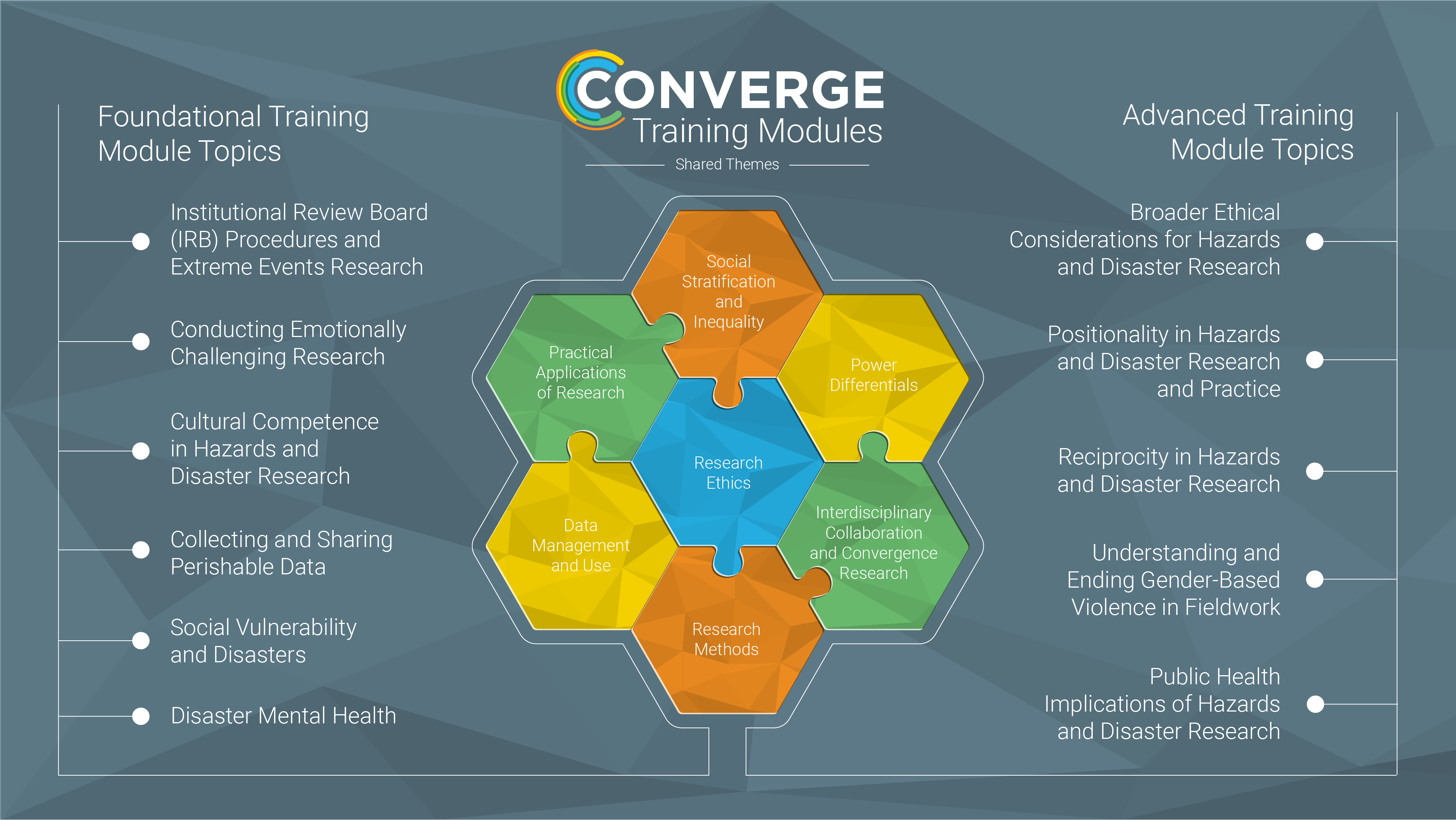
Technology transfer ensures that research innovations can be put to practical use by providing products or tools to a wide array of users. Recently, Frontiers in Built Envirornment published a special collection on technology transfer resources developed by the Natural Hazards Engineering Research Infrastructure (NHERI). The five-article collection featured different forms of technology transfer from NHERI-affiliated research partners—including the Natural Hazards Center-based CONVERGE facility.
The CONVERGE article, co-authored by Rachel Adams, Candace Evans, and Lori Peek, focused on its training modules series, which was designed to support students and emerging researchers in conducting ethical and methodologically sound disaster studies.
At the time of publication, the modules had reached more than 6,300 users, including students and other early career researchers. As detailed in the article, the reach of the modules has continued to expand through ongoing partnerships with research and practice-oriented organizations such as the Centers for Disease Control and Prevention, the U.S. Geological Survey, and the International Association of Emergency Managers.
“It's really exciting to reach such a broad audience with these trainings,” says Candace Evans, graduate research assistant at the Natural Hazards Center and co-lead developer of the CONVERGE Training Modules. “By drawing on e-learning best practices and interactive strategies to engage users, these modules are helping train a diverse next generation of hazards and disaster researchers and practitioners.”
While each of the 11 available modules focuses on a distinct topic, the modules share seven cross-cutting themes: research ethics, social stratification and inequality, power differentials, interdisciplinary collaboration and convergence research, research methods, data management and use, and practical applications of research.
“These shared themes reveal important connections across all the modules that reflect some of the key concerns, priorities, and topics in the field,” said Rachel Adams, research associate at the Natural Hazards Center and lead developer for the CONVERGE Training Modules.

In addition to the modules, the CONVERGE website provides supplementary materials that accompany the modules, including the CONVERGE Assignment Bank and Annotated Bibliographies.
“We developed these additional materials in response to the widespread demand for training among members of the research community,” said Lori Peek, director of the Natural Hazards Center and principal investigator for the CONVERGE facility. “This really is a community-driven resource.”
Over the next two years, the CONVERGE team plans to continue to develop and release modules focused on a variety of topics, including Indigenous sovereignty, the history of social science disaster research, and best practices for data publication and reuse.
To receive updates and information on new CONVERGE training modules and other resources, please subscribe here.
About the Natural Hazards Engineering Research Infrastructure
Funded by the National Science Foundation, the Natural Hazards Engineering Research Infrastructure—NHERI—is a network of research and experimental facilities dedicated to reducing damage and loss-of-life from natural hazards such as earthquakes, landslides, windstorms, tsunamis, and storm surge. NHERI provides the natural hazards engineering and social science communities with the state-of-the-art resources needed to meet the research challenges of the 21st century.
The CONVERGE Training Modules are based upon work supported by the National Science Foundation Natural Hazards Engineering Research Infrastructure (NSF Award #1841338) with supplemental funding from the Centers for Disease Control and Prevention (CDC) and the U.S. Geological Survey (USGS). Any opinions, findings, and conclusions or recommendations expressed in these materials are those of the authors and do not necessarily reflect the views of the NSF, CDC, or USGS.